|  |
|---|
|  |
|---|
|
1 Camberry Close Basingstoke Hants RG21 3AG U.K. ISBN 1-870312-04-X |
Christ and Christianity in Persian PoetryBishop Hassan Dehqani Tafti[ List of Books by Bishop Hassan Dehqani Tafti | گفتگویی با اسقف حسن دهقانی تفتی و همسرشان مارگارت ] | ||||||||||||||||||||||||||
|---|---|---|---|---|---|---|---|---|---|---|---|---|---|---|---|---|---|---|---|---|---|---|---|---|---|---|---|
|
¤ Introduction
1) Classical Poets from Ferdowsi onwards.
2) Modern Poets. |
Classical Persian Poets:
|
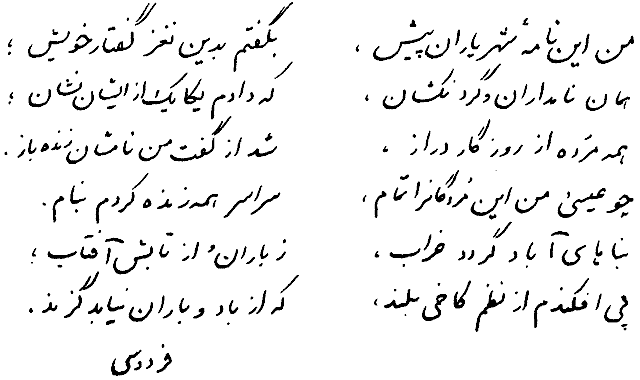
|
|
'These tales, which relate to the monarchs of old,
In volumes of elegant verse I have told. The men of renown, and ofprowess and fame, Whose'deeds are recorded herein name by name, Time swept them aside, and death stilled heart and brain-, But here in my verses they live once again. Like Jesus, whose voice called the dead back to life, I've wakened dead heroes of struggle and strife.
|
Another classical poet who has sung about Christ is Nasser Khossrow (11th Century).
Edward Browne says about him in his 'Literary History of Persia'
It would appear that the poet had some knowledge of the contents of the Bible . . . .'
In the following lines by Nasser Khossrow, translated by Norman Sharp, Jesus is mentioned:
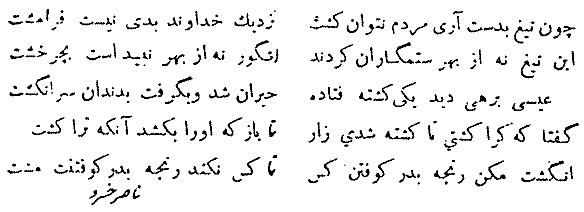
|
'Whene'er a knife you take, it's not meant for assault. |
Also by him and translated by Norman Sharp are these lines:

|
'Account him no man, who is faithless and false, |
Then we come to Ghazzali - known in the West as Algazel (12th century 1059 - 1111) though not very famous for his poems, he was a great mystic and he has a lot about Christianity in his poems. Dr. Kenneth Cragg has this to say about him:
'The great Al-Ghazzali Justified his use of John's Gospel by his belief that God had granted to Jesus a special 'Khossossiat' or personhood, where he was allowed to use theopathic language which had only metaphorical value'.
In his celebrated work 'Ehya Uloom-el Din' Ghazzali attributes many sayings to Jesus, some of which are obviously from the Gospels. Some are from other sources:
e.g. i 'Lay up your treasure with Him who will not waste it.' 3.151 (Matthew 6:19)
e.g. i Jesus one day walked with his disciples and they passed by the carcase of a dog. The Apostles said:'How foul is the smell of this dog.' But Jesus said: 'What pearls are its teeth!' 3.108
About a century later Nezami from Ganjeh now in the USSR, put this lovely story into poetry. The Revd. Norman Sharp has translated it thus:
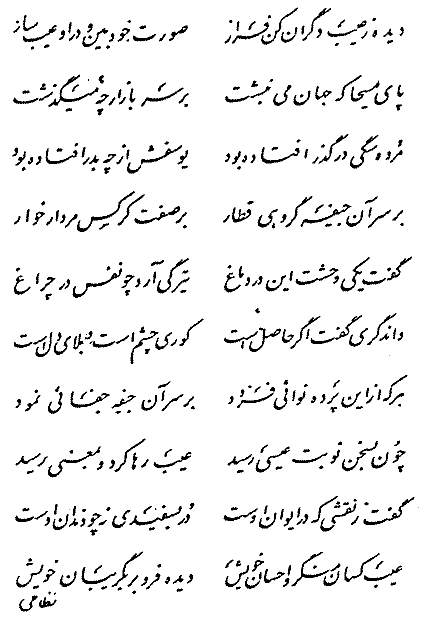
|
'Withhold thy gaze from others'faults and defects, |
We now go to Mowlavi or jalal al-Din Rumi (Died in 1273), whom I mentioned before.
He has a lovely poem about the blind and the lame coming to Jesus for healing. This is a famous poem which has been translated by Norman Sharp who had it printed, together with a picture painted by Mussavar ul Mulk. However, I also found another translation of the same poem by E.H. Whinfield and quote this:
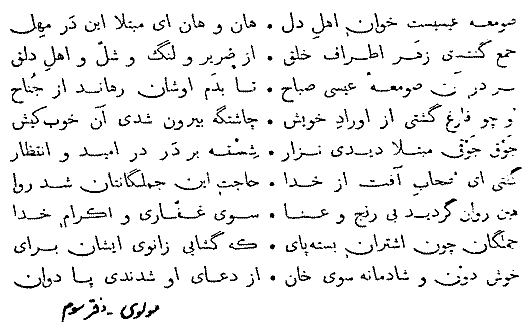
|
|
We have got the first verse of this poem over the doorways of most of our churches in Iran, and perhaps that is one of the reasons why the fanatics have left our churches unmolested.
Now we come to Sa'adi who died in Shiraz in the year 1294. One of the stories in his 'Bootsan' compiled in 1257 is an enlarged edition of the parable of the Pharisee and the Publican recorded in St. Luke's Gospel 18:9-14. It is a smafl beautiful parable about humility - how a Mullah goes and prays to God in a pompous way. Then a very poor person prays in a humble way 'I am a sinner - please forgive me'. Christ says that the poor person was forgiven, but not the other one who was proud. Sa'adi made this into a very long poem. The following is part of that poem translated by Captain H. Wilberforce Clarke - it is a literal translation:
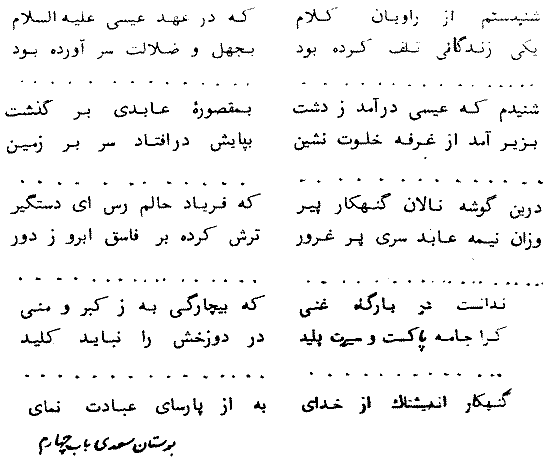
|
'A compiler of the traditions, thus related, in talk - |
Then we come to Mahmoud Shabistary who died in 1320. In 'Gulshan-l-Raz'(Rose Garden of Mystery) he has a poem about Jesus which is rather difficult to understand in Persian, but Mr. Sharp has translated it with his usual sensitivity:
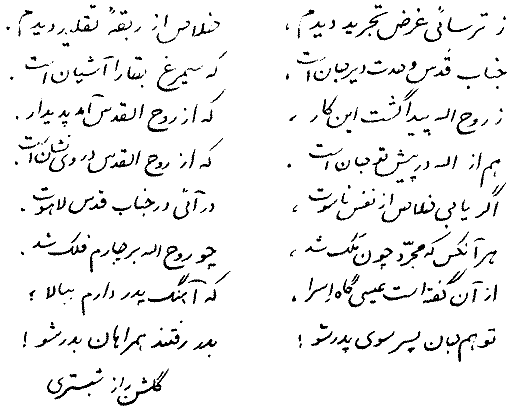
|
'That man a liege of Christ I hold to be, |
Then we come to Hafiz, perhaps the greatest among the Persian poets (Died in Shiraz in 1389).
A.J. Arberry, in a small book, has collected 50 poems of Hafiz. One of the sonnets is a translation by R. Le Gallienne, starting thus:

|
'In th e garden sky I sa w th e n e w m oon reaping |
In this sonnet there is a line in which Christ's name is mentioned and is very well known. Unfortunately R.Le Gallienne left this out in his translation, but Mr. Sharp has done a good rendering of it into English which runs as follows:

|
'If thou, like Christ, be pure and single-hearted, |
Those of us who have visited the tomb of Hafiz in Shiraz have noticed these lines inscribed in large lettering of the Naskh character on glazed 'le on the Eastern wall of the compound where the tomb 's situated.
Hafiz has got another well known sonnet in which Christ and the Holy Ghost are mentioned. Arberry has rendered it into English. He has the gift of poetical translation - obviously himself a poet at heart - he is not worried about form and literal translation, but with the spirit and the inner meanings. This is how he has used his gift on this famous sonnet,

|
'Long years my heart had made request |
The last but one line goes like this:

|
'And if the Holy Ghost descend |
I think it is a beautiful translation, and if it be not counted as literary blasphemy, perhaps in this case he has improved on Hafiz!
There is no time to quote lines from Sanale, Khaqani, Attar, jami and others, but we cannot leave this section without mentioning Hatif of Isfahan who died in 1783. He is not a very famous poet in Persian literary history, but he has a'Tarji'a Band'which has made him famous. It is perhaps one of the best single poems in Persian Mystic poetry. The poet goes to a fire temple, to a church, and to a pub, and everywhere he finds that people worship the same One God. The part which deals with Christianity is an attempt to explain the mystery of the Trinity. The description of a discourse with a beautiful girl in church perhaps reveals the Armenian influence in Persia from the time of Shah Abbas onwards.
Here is Mr. Sharp's translation of that part of the'Tarji'a Band'dealing with the mystery of the Holy Trinity:
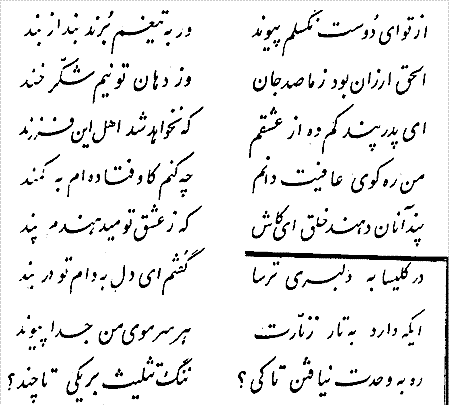
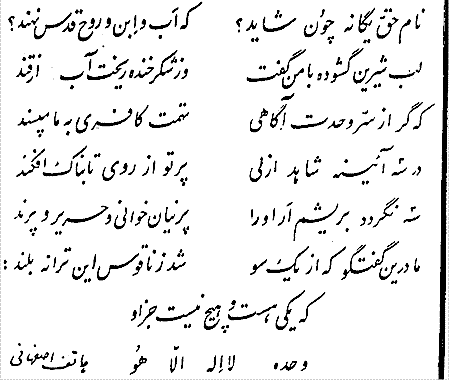
|
'Once in a church I saw a Christian maid. |
Norman Sharp's translation here, as elsewhere, is admirable. He keeps to the rhyme and rhythm. He has even found three different words for one material, namely'silk', which Hatif has used in the original Persian.
Now we come to Contemporary Poets I shall mention just one: Dr. Hamidi Shirazi who has a poem directly about Christianity. Again Mr. Sharp has translated it, and has this to say about it:
'These Persian verses of Dr. Hamidi Shirazi are a poetical translation of part of the famous inscription on a large stone tablet set up in China by Persian Christians in 78 I.'
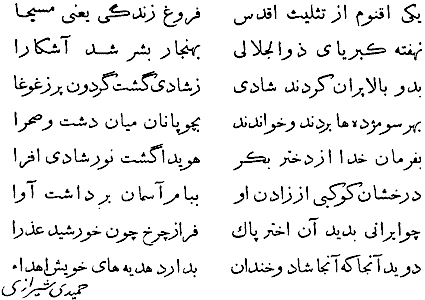
|
'One Holy Person of the Trinity, |
 Please send your comments, questions & opinion to ChristInPersianPoetry@farsinet.com
Please send your comments, questions & opinion to ChristInPersianPoetry@farsinet.com

|  |
|---|